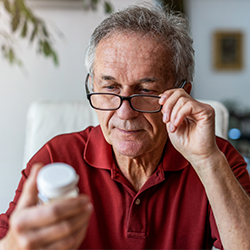For decades, the power of the placebo effect was thought to lie in patients’ belief that they were—or at least, could be—receiving a pharmacologically active treatment. A new study by physician-researchers at Beth Israel Deaconess Medical Center suggests that patients don’t need to be deceived to receive benefit from treatment with placebo.
In a randomized clinical trial published in the journal PAIN, researchers found participants with moderate to severe irritable bowel syndrome (IBS) who were knowingly treated with a pharmacologically inactive pill—referred to as an honest or open-label placebo—reported clinically meaningful improvements in their IBS symptoms. More than two-thirds (69%) of participants who received the open-label placebo experienced improvements that were significantly greater than those reported by participants assigned to a no-pill control group. There was no difference in symptom improvement between those who received open-label or double-blind placebos. The results build on the research team’s previous findings and challenge the long-held notion that concealment or deception are key elements in the placebo effect.
For the rigorously designed clinical trial, researchers enrolled 262 adult participants 18 to 80 years old with at least moderately severe IBS. Participants were examined, filled out baseline questionnaires, and were randomized into one of three study arms—open-label placebo; double-blind (which included double-blind placebo or double-blind peppermint oil); or no-pill control. During their examinations, all participants discussed the placebo effect, the trial, and its aims with their physicians.
The open-label group received pill bottles labeled “open-label placebo” and were told that the pills inside were pharmacologically inert but could make them feel better through the placebo effect. The double-blind group received pill bottles labeled “double-blind placebo or peppermint oil.” Participants in the double-blind group received either a placebo or an identical pill containing peppermint oil, but neither they nor the research team knew which they received. All participants who received pills were instructed to take one pill three times a day, 30 minutes before meals. The no-pill control group received no pills but otherwise followed an identical study protocol.
According to one of the lead researchers, if the presumption that deception is necessary for placebos to be effective is false, then many theories about the mechanisms that drive placebo effects may need modification.
Edited by Gary Cramer



